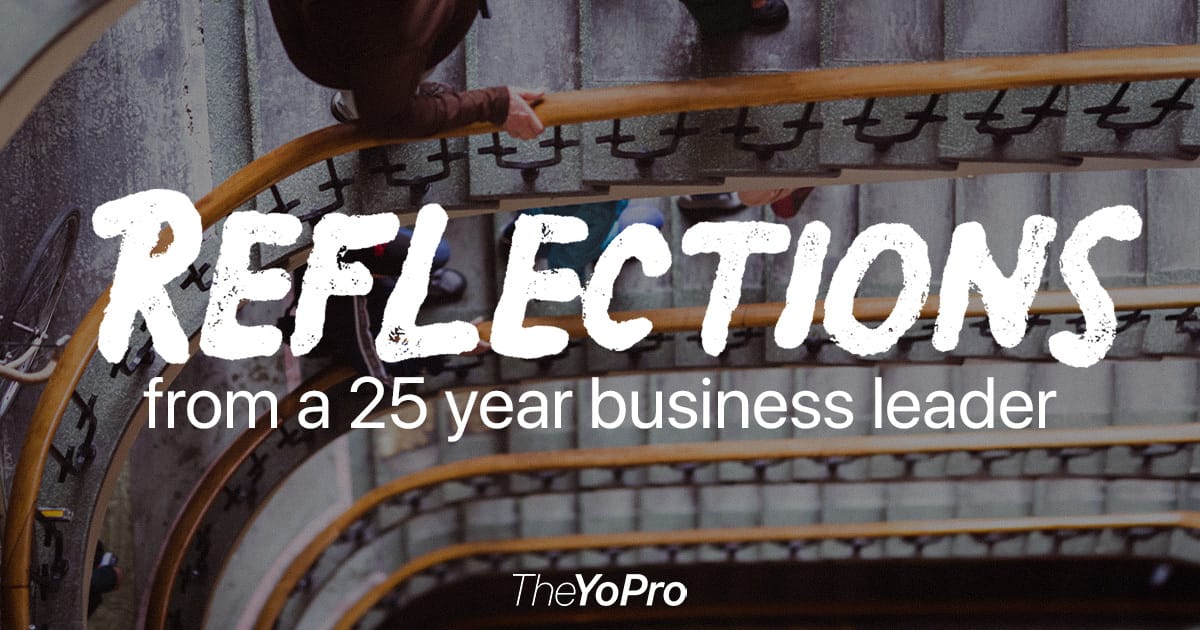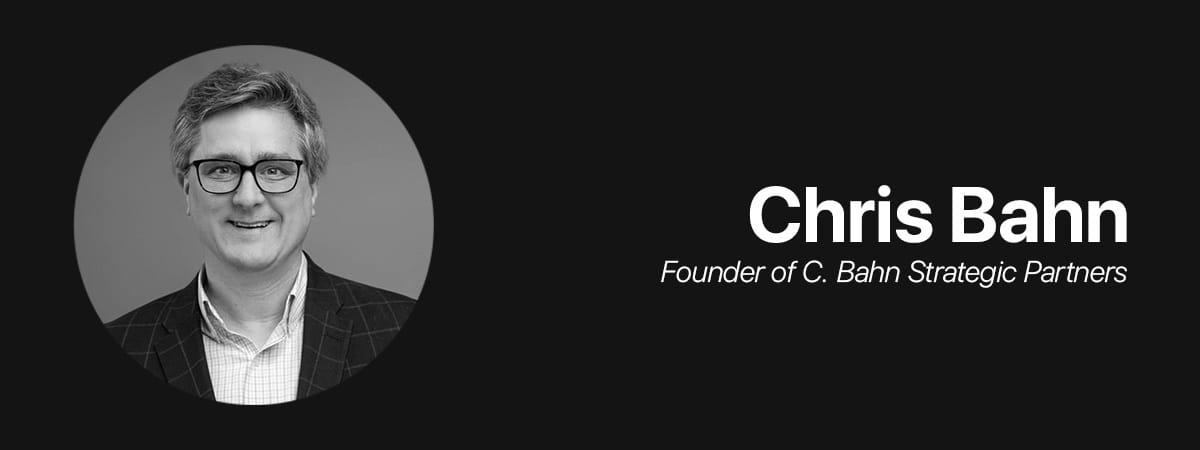- The Yo Pro
- Posts
- Reflections From A 25 Year Business Leader 🤝
Reflections From A 25 Year Business Leader 🤝
Start, Stop, and Continue with Chris Bahn

Guest Written by Chris Bahn, 6:04 Minute Read Time
Each month, The Yo Pro features experienced leaders as Guest Writers to share wisdom and equip the next generation of leaders in life and work.
As we close out September 2025, enjoy story and insights from Chris Bahn, who has over 25 years as a business leader — you're in for a treat!


A few months ago, over coffee with a talented pro weighing his next step, he asked who my competitors were in strategic communications, PR, and consulting. My gut reaction, candidly, was the answer I would have given in my twenties and thirties:
Everyone.
Win-at-all-costs. Crush the world.
It took years of experience — and some hard-earned humility — to understand how wrong I was. That is not how I operate now. I genuinely believe there is room for all of us — if we work hard, treat people well, build trust and seek connection. This evolved approach is the entire operating premise for C. Bahn Strategic Partners, which I launched in January 2025.
I did not learn that overnight. For years I believed speed and willpower were the whole game. I was hardheaded, allergic to guardrails and too focused on the next move to savor the people around me. Detail-minded teammates and bosses felt like hindrances, not what they truly were — the structure that lets people like me run fast without leaving destruction in their wake.
Fortunately, relationships shaped my path from the start. People began investing in me before I fully appreciated it. At 18 my college adviser sent me to The Jonesboro Sun and I got hired probably before I had any business being there.
Looking back, I was moving too fast to build real relationships higher up — chasing the next assignment and the next job instead of cultivating sponsors and mentors who could more fully shape my growth.
At Arkansas State I studied News Editorial Journalism with a political science emphasis and started working as a paid reporter at 18. I graduated in 1999 with four years of bylines, an internship on Capitol Hill and real-world experience already behind me.
I was a climber, changing jobs frequently — leaving several a year-to-the-day from hiring — and had my sights set on a national sportswriting job. I was convinced of my path until the company I worked for in 2012 stopped investing in sports. The identity I’d crafted and built my life upon fell away overnight — but the serious depression and doubt lingered for a time.
Then a door opened. Arkansas Business Publishing Group owner Olivia Farrell and Arkansas Business editor Gwen Mortiz were the next in a long line of people that God has blessed me with who saw more in me than I saw in myself. They built a relationship with me when I was still too fast and headstrong to fully understand its value.
The opportunity they gave me as a business reporter sat me across the table from leaders at J.B. Hunt, Walmart and Tyson, along with the leaders of smaller but formidable entrepreneurial ventures across Arkansas. Business reporting turned out to be a lot like sports reporting — and like what I do now: putting numbers and people in context.
In the years that followed, another mentor stepped in. Mitch Bettis, now owner and President of Arkansas Business, offered me a role running a couple of publishing divisions. I had no experience — and he didn’t mind. He told me, “We know what you’re good at. If you can’t do this job, we’ll put you back to what you did best.”
Turns out I could do the job. From Mitch — and from the business leaders that role let me connect with — I learned the value of continued growth. Coachability isn’t a nice-to-have; it’s the difference between staying where you are and becoming who you are meant to be.
I continue to recalibrate how I work — especially around guardrails and collaboration. As I was wrestling with opening my own business, I asked Mitch a blunt question: was God pushing me to build my own thing or telling me to submit to authority and stop being so stubborn?
He laughed and said, “Why can’t He be teaching you both?”
That conversation has been in my head ever since, a reminder — like that recent coffee — that I’m better, not cured.
“Vulnerability is not weakness; it’s our greatest measure of courage.”
— Brené Brown, Daring Greatly
Sidebar — Guardrails make speed possible
Clarity reduces rework; rework kills momentum.
Boundaries protect trust (and budgets).
Put detail people at the edges and the whole team can run fast, longer.
There were lots of wins in my 20s and 30s — and there were hard lessons. The wins were real — a paid newsroom job at 18, statewide bylines and a growing national profile, then a pivot into business coverage that opened doors and the Arkansas relationships that still power my work.
The hard lessons were just as real. My competitiveness narrowed my world and made me slow to accept mentorship. I often resisted the structure my detail-minded colleagues and bosses offered, mistaking their diligence for drag.
When the sports track disappeared, so did the identity I had wrapped around it. What saved me were leaders who believed I could do more, and the entrepreneurs and business leaders who let me sit at their tables and learn.
Thank God for mentors who continued to pour into me even if I didn’t fully understand or embrace them.

➞ Start
If I could relive that season, I would start sooner on the things that now anchor my work. I would seek out mentors early and often, not just admire the greats from afar. I would buy them coffee and ask how they approach the craft, what they value and what makes them great. I would soften toward guardrails — appreciating the detail partners who mark the edges so the team can run. I would not only collect other people’s stories, I would more quickly apply the lessons and turn them into practice.

➞ Stop
I would stop making the next big thing my identity. Ambition is good; obsession narrows you. I would stop comparing myself to others, and I would keep starting with questions — double-checking assumptions even when I think I know the answer. That shift from certainty to curiosity changed the way I work.

➞ Continue
I would continue the parts that actually worked: relentless curiosity about people, a respect for clear writing and plainspoken communication and a bias for connecting others to opportunity. Those habits compound.
One more thing I pass along because it helped me: A Fortune 500 executive once told me that you should update your résumé annually as a means of self-review. The idea is this: if you don’t have fresh wins to add — and old wins to retire — you have a choice to make. Either commit to being better where you are or go find a place where you can do your best work.

➞ Where I’m Going
Back in high school, Arkansas felt like the center of the universe — the Hogs won the NCAA title during the 1993–94 season, the President of the United States was an Arkansan and Bentonville’s Sam Walton was the world’s richest man. It cemented my conviction that you can build something meaningful here. Arkansas — and Arkansans — are capable of anything. That conviction still drives me today.
I do my work through conversations that connect — one-to-one, one-to-many, one-to-few. This includes connecting people and ideas, planning convenings, translating complex change for operators and founders and lending communications to causes I care about.

➞ Final Thoughts
Keep chasing the wins — I will not suggest otherwise — but redefine how you win. Win with people, not at their expense. Win with clear priorities, not frantic pace. Seek mentors early, invite guardrails and ask better questions before you offer answers. Put relationship time on your calendar like any other priority, and measure progress by the trust you build and the problems you help others solve.
The real wins are in connection.

➞TheLearningLeader
3 Books Chris Bahn Recommends Young Professionals Read Today:
Lincoln on Leadership by Donald T. Phillips
Daring Greatly by Brené Brown
The Five Dysfunctions of a Team by Patrick Lencioni

As always, let us know how we can help you navigate your world as you navigate the world.
In Your Corner.
See you next Tuesday!

Did someone share The Yo Pro with you? Subscribe below to receive a newsletter like this one each Tuesday.
Reply